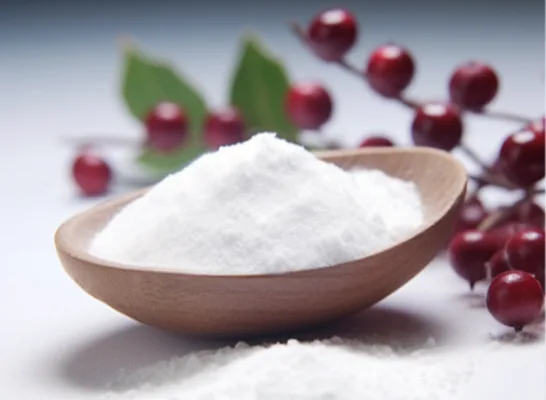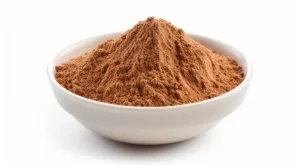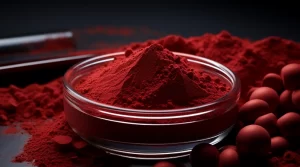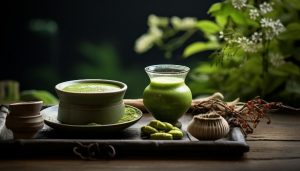Analysis of whitening principle and effectiveness of arbutin

What is alpha arbutin?
Chinese name: alpha arbutin
English name: Alpha-Arbutin
INCI name: 4-hydroxyphenyl-D-glucopyranoside
Molecular formula: C12H16O7
Molecular weight: 272
Research and development of alpha arbutin
Alpha-Arbutin is a hydroquinone glycoside compound, which is extracted from the leaves of the azaleaceae plant arbutin. It can inhibit the activity of tyrosinase in the body and prevent the production of melanin, thus reducing skin pigmentation, removing color spots and anti-inflammatory effects, mainly used in cosmetics. The molecular structure of arbutin has two kinds of structural and functional groups: one is glucose residue; The second is the phenol hydroxyl group. The physical state of alpha-arbutin appears white to light gray powder, more soluble in water and ethanol. Arbutin can inhibit the binding of tyrosine and tyrosinase through competitive inhibition, thus achieving whitening effect.
The efficacy of alpha-arbutin
1. Inhibition of tyrosinase
*1: Effect of 50% inhibition concentration on tyrosinase activity. *2: Parameter indicating the affinity of the inhibitor to tyrosinase [1].
α-arbutin inhibits tyrosinase activity through a variety of mechanisms, which provides molecular basis for its possible medical applications [2].
• α-arbutin can directly bind to the active site of tyrosinase, thereby inhibiting its catalytic activity. Studies have shown that α-arbutin can insert into the catalytic region of tyrosinase molecules, and steric hindrance occurs with amino acid residues in the enzymatic reaction center, thus reducing the catalytic ability of the enzyme.
• α-arbutin may indirectly inhibit tyrosinase activity by inducing conformational changes. Some studies have shown that the binding of α-arbutin can increase the surface hydrophobicity of tyrosinase protein molecules, resulting in a change in molecular conformation, which deforms its active center and reduces the ability of the catalytic substrate.
Alpha-arbutin may also have affinity interactions with certain functional groups of proteins, and this interaction may impede the entry of the substrate molecule into the active site of the enzyme, thereby weakening tyrosinase activity.
• α-arbutin may also inhibit and regulate the transcriptional expression of tyrosinase mRNA.
2. Inhibition of melanin
• α-arbutin can directly inhibit the activity of tyrosinase, which is one of the key rate-limiting enzymes of melanin production, and its inhibition will directly reduce the rate of melanin synthesis.
• 2. α-arbutin can down-regulate the expression of microtubule associated protein (MITF) gene, which is the main transcription factor regulating the transcription of genes related to melanin production, and its down-regulation can inhibit the synthesis of various melanin synthetases such as tyrosinase, thereby inhibiting melanin production.
• α-arbutin can also activate intracellular cAMP signaling pathway, and the elevation of cAMP signaling will inhibit the expression and activity of MITF, and ultimately lead to the inhibition of melanin synthesis pathway.
• α-arbutin acts as an antioxidant to scavenge reactive oxygen species free radicals, which may also be related to its inhibition of melanin synthesis.
Notes on the use of alpha-arbutin
In February 2023, the SCCS issued its final opinion on the safety of α-arbutin and β-arbutin in cosmetic products (SCCS/1642/22), concluding as follows:
● The maximum safe use concentration of alpha-arbutin in face cream is 2%, and the maximum safe use concentration in body milk is 0.5%, and both are also safe when used together;
● The maximum safe use concentration of β-arbutin in face cream is 7%;
In products containing α-arbutin or β-arbutin, the hydroquinone content should be kept as low as possible and should not be higher than the inevitable trace amount in the two arbutin. In the latest study submitted by the applicant, the limit of quantification (LOQ) of hydroquinone was 3ppm and the limit of detection (LOD) was 1ppm;
● Total exposures of alpha-arbutin (2% in creams and 0.5% in body lotions) and β-arbutin (7% in creams) are considered safe.
arbutin Manufacturer / arbutin Manufacturers/ arbutin Supplier / arbutin Suppliers/ arbutin Factory:
www.backvita.com
Email: [email protected]
Telepon +86 (029) 8187 2325



